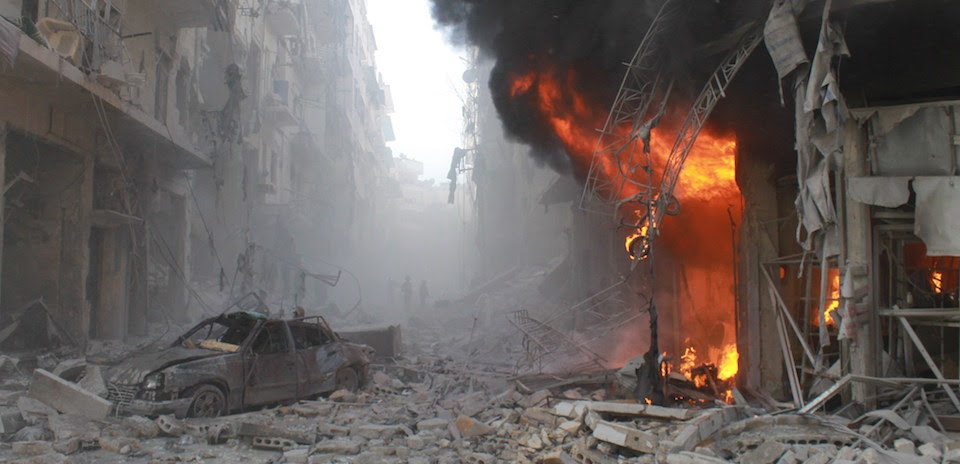
Being leery of “threat inflation” can be a good thing, but the last days are going to be filled with the worst threats our planet has ever seen. Because the United States is so strong and in such a favorable geopolitical location, elites, commentators and policymakers have to exaggerate the threats to justify bigger military spending and to convince the public to keep meddling in the far-flung corners of the earth. While some exaggeration may exist, it is prudent to consider what Jesus said would come upon the world in the last days. When Jesus said there would be strife in the last days, He wasn’t kidding – think about the destruction of Jerusalem and the French Revolution combined on a global scale. Both events are described as prophetic types of the last days. See Desire of Ages, page 631, Patriarchs and Prophets, page 166, and Education, page 228.
And at the moment, genuine concern is warranted. While the world may not be on the brink of a major world war yet, flammable material is, however, accumulating and it is hard to have high confidence in the political leadership in several key countries (including the United States).
Is the world more secure than it was a year ago? Specifically, is the risk of war increasing or decreasing? Is the danger of a serious economic crisis higher or lower? Are the institutional arrangements and norms that help smooth and resolve conflicts of interest and enhance the prospects for international cooperation more or less robust than they were in June 2016?
The upside: currently the likelihood that you will die a violent death is vastly lower than it was at nearly all other moments in human history. The major powers haven’t fought each other directly for over 70 years. The number of low-level conflicts remains consistent. Although the Islamic State is widening its reach, the actual risk from terrorism remains relatively low outside active conflict zones. But that’s no guarantee of continued tranquility, particularly in light of prophetic forecasts.
Globalists think there are other “straws in the wind” as well, like the rejection of nationalism in France and the Netherlands, and that the Islamic State’s self-proclaimed “caliphate” is now headed for the dustbin of history (though not violent extremism). Columbia now has a peace agreement. The war in Ukraine has settled down. And there are others.
The downside: North Korea’s aggression, Islamist movements appear to be gaining strength in Indonesia threatening its tolerant atmosphere, the Philippine government’s war on drugs and terrorism have left a heavy human cost. China is still aggressive in the South China Sea and other matters have made Asia less safe than a year ago.
Add to that the Middle East conflicts in Yemen, Syria/Iraq and between Qatar and Saudi Arabia, which create much more potential for trouble than back in 2016. And the tension is strong. Russia recently warned the U.S. to stop further attacks on Syrian aircraft. Plus Saudi Arabia is continuing its brutal military campaign in Yemen while simultaneously trying to force neighboring Qatar to silence Al Jazeera, sever its contacts with Iran, and basically accept Saudi predominance. It is hard to see a silver lining in these developments.
And now the U.S. is on the verge of sending more troops into Afghanistan into an unwinnable war. America knows it can’t win; nor can it break even, yet neither Democrats nor Republicans will let America out of the game.
Lastly, the institutional underpinnings of the present international system (the New World Order) continue to fray, which elites say will decrease stability in the world.
NATO is weaker than a year ago, and doubts about the U.S. role in Asia have been rising since President Trump withdrew from the Trans-Pacific Partnership. Also, his responses to North Korea’s aggression and the Philippines haven’t lent to stability. Without America’s help, Germany wants Europe to chart its own course. And Canada’s foreign minister says, “international relationships that had seemed immutable for 70 years are being called into question,” adding that America’s decisions are forcing Canada “to set our own clear and sovereign course.”
The ugly side; the United Kingdom is in political disarray. France has gone from one leader to the next changing its geopolitical direction each time. Italy hasn’t had effective political leadership for a very long time. Recep Erdogan in Turkey has consolidated power but is not good at running the country. Incompetent and/or grossly scandalized and tainted rulers have led Brazil, Afghanistan, Poland and throughout the Middle East. And now the United States has its own political challenges. For instance, Mr. Trump is apparently trying to gut the State Department of its diplomatic assets, which doesn’t bode well in an erratic and unpredictable world.
The result is looking like the worst of both worlds: the U.S. is still engaged in most of the world’s trouble spots, but the ship of State is now being steered by a novice (Jared Kushner), which suggests more instability to come.
“Erelong we shall understand what that night means. The Spirit of God is being grieved away from the earth. The nations are angry with one another. Widespread preparations are being made for war. The night is at hand. Let the church arouse and go forth to do her appointed work. Every believer, educated or uneducated, can bear the message.” Testimonies for the Church Vol. 9, page 26.
Source References
